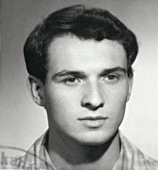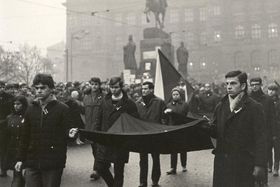 50 years ago today, on January 16, 1969, Jan Palach, a 20-year-old university student in Prague, set himself on fire in Wenceslas Square. His suicide by self-immolation was not only a protest against the Soviet Union’s invasion of Czechoslovakia the previous summer, but more immediately at the time, it was a cry to awaken the Czech people from their apathy, post invasion. (The Soviet invasion of 1/2 million troops in 1968 was to squelch the “Prague Spring,” a movement that had been growing to secure some freedoms of speech, travel and the media.) Palach believed that the people had become complacent with the occupation and no longer had the will to resist.
50 years ago today, on January 16, 1969, Jan Palach, a 20-year-old university student in Prague, set himself on fire in Wenceslas Square. His suicide by self-immolation was not only a protest against the Soviet Union’s invasion of Czechoslovakia the previous summer, but more immediately at the time, it was a cry to awaken the Czech people from their apathy, post invasion. (The Soviet invasion of 1/2 million troops in 1968 was to squelch the “Prague Spring,” a movement that had been growing to secure some freedoms of speech, travel and the media.) Palach believed that the people had become complacent with the occupation and no longer had the will to resist.

Site in Wenceslas Square that is a memorial
Although Palac was hailed as a hero (some 200,000 people attended his funeral), and his death sparked further protests, the occupation was quite effective at silencing the people. But he was not forgotten, nor was his death in vain. 20 years later, on January 15, 1989, a new protest movement brought demonstrators to Wenceslas Square to commemorate Palach’s sacrifice to the cause of freedom. They came every day for a week, which later became known as “Palach Week.”

Palach’s funeral march: photo courtesy of Praha T.V. archive
If you know your history, you will recall that by the end of that same year, in November 1989, all of the resistance energy that had been building across the country, culminated in a massive occupation of Wenceslas Square, this time by the Czech people themselves. Their Velvet Revolution brought down a Soviet controlled government and ushered in their first democratically elected post-war president.

Photo courtesy of Prague Daily Monitor
I wish I had been there. I can only imagine the electric thrill of people realizing their freedom for the first time. Oh, if only Jan Palach could have been there to see it! His sacrifice to sting the conscience of his people, reminded me that our freedoms are not a guarantee. We must be vigilant to protect them. They can be taken away, and they can disappear in the most insidious way possible, chipped away at little by little while we are “asleep.” Usurping of our freedoms cannot be checked or changed if we are apathetic.
Honestly, I cannot begin to imagine doing what Jan Palach did for the sake of my beliefs but history has proven that his actions were instrumental to a greater good than his own. Today all across the Czech Republic he is being honored and remembered through exhibitions, programs and ceremonies and by a candlelight march at 6:00 p.m. from Wenceslas Square to Old Town Square. As Americans who say we value our freedom, we would be good to pause and remember him too.

Palach’s memorial Wenceslas Square: photo courtesy Praha T.V.

What a sobering reminder that freedom is never a guarantee. Thank you for sharing this very interesting piece of history
LikeLike
Thanks for reading, Marie-Claire. We all need reminding!
LikeLiked by 1 person
Incredible story. I do remember this. Hope some people are listening.
LikeLike
Thanks for your comment Sue. Yes, we can only hope that we have “ears to hear”
LikeLike
One thing I have never understood was the role Alexander Dubcek played in the Velvet Revolution. I had always thought of him as a hero against the Soviet occupation, but some people I met in Prague when I traveled there in 2013 seemed to consider him a political hack who was something of a Soviet puppet. What is your understanding of his place in their history?
LikeLike
Great question Linda. Dubcek was indeed a Socialist at heart but he believed in “socialism with a human face.” Basically while he was the Communist’s top guy in Prague, up to and including the “Prague Spring,” he wanted to “soften” Communism by giving the people a certain amount of freedom, like greater freedom of the press and less restrictions for people to travel. He did work with the protesters to try and meet their demands. All the while he kept reassuring Moscow that everything was “under control” because he sincerely believed that there could be some kind of balance between these two ideologies. He tried to walk a thin line between the two, so basically to those who wanted democracy he was a Communist, and to the Soviets he was dangerous and they weren’t buying his spiel. After the Warsaw pact members rolled their tanks into town, Dubcek was arrested and sent to Moscow and then eventually he was sent back to Prague where he retained a position of power- which could certainly be viewed as him being in essence a Soviet puppet. During the Velvet Revolution many people remembered him as being sympathetic to their cause for freedom and saw him as a friend of democracy. But he himself still believed that Socialism/Communism was still a good solution as long as you “fixed” it. Of course, the people were not going to have any part of going back to try and put a “human face” on any form of socialism and to those folks he was and would always be a Communist.
LikeLike